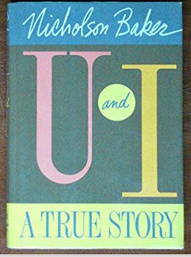The Globe and Mail recently published a summer reading feature and asked staff to share “The book that changed me.”
“Nicholson Baker’s U and I: A True Story changed the way I thought about books, writers, writing, reading and what it meant to be honest on the page. That’s quite a lot for one book to have accomplished.
“U and I is a (short) book-length essay about Baker’s obsession with John Updike – a writer his mother admired (she once laughed out loud at Updike’s description, in describing a golf game, of a ‘divot the size of an undershirt’), and whom Baker thereupon wanted to emulate. The book begins with Baker deciding not to write about Donald Barthelme, who had just died, but to write about Updike instead, because the stakes in writing about a living writer seemed higher, more consequential.
 “At that point, the book departs from convention completely: Baker admits, for instance, that he has only read half a dozen of Updike’s more than 20 novels (he wrote nearly 60 books, in total). But lack of familiarity never stops a young writer from being obsessed by an older one! In fact, it’s lack of familiarity that stokes the obsession. And how obsessive he is! Baker wants to be Updike: He notes that, while he doesn’t golf, they both have psoriasis, both on their penises – which Baker desperately hopes gives them something in common. Of course, as the always hilarious, brilliant, stylish and readable Baker eventually reveals, what they really share is the ability to experience the world ecstatically.
“At that point, the book departs from convention completely: Baker admits, for instance, that he has only read half a dozen of Updike’s more than 20 novels (he wrote nearly 60 books, in total). But lack of familiarity never stops a young writer from being obsessed by an older one! In fact, it’s lack of familiarity that stokes the obsession. And how obsessive he is! Baker wants to be Updike: He notes that, while he doesn’t golf, they both have psoriasis, both on their penises – which Baker desperately hopes gives them something in common. Of course, as the always hilarious, brilliant, stylish and readable Baker eventually reveals, what they really share is the ability to experience the world ecstatically.
“Baker somehow manages to take an ancient, rather pompous genre – the literary essay of writerly appreciation – and turn it into something it has never been before, an utterly candid, and therefore shocking, examination of the way we really read, and use books, as opposed to the way we pretend to read, loaded down by all our cultural pretensions. Baker thinks the stuff we forget we’ve read is more important than what we remember: Throughout the book, he keeps quoting Updike from memory, and then exposing how shoddy his memory is, by revealing the actual passage he thinks he’s remembering.
“And it’s very funny, and the story never flags. But I guess what I admire most about U and I is its compassion: for Updike, his industriousness and his failures; for the impossible challenge of writing – and living – honestly, and how often we fail at both; for, most of all, readers, via Baker’s assumption that every reader will want to admit the truth about themselves and books, and therefore feel freer than they were when they started the book. That’s what reading’s all about, isn’t it?”
